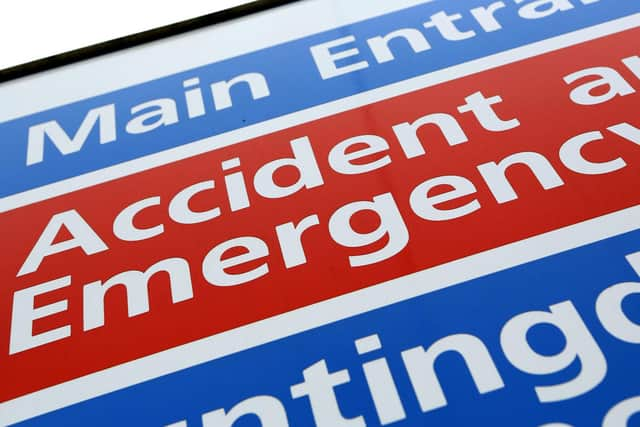People from most deprived areas made nearly a quarter of all A&E visits at Doncaster
and live on Freeview channel 276
The British Red Cross said their work supporting people shows a close link between deprivation and demand for emergency health services and called on the Government to release more funding to address wider health inequalities.
NHS Digital figures show 46,080 people living in the 10% most deprived areas visited A&E at Doncaster and Bassetlaw Teaching Hospitals NHS Foundation Trust in the year to March.
Advertisement
Hide AdAdvertisement
Hide AdThey accounted for 23.7% of all visits, while the figure stood at just 0.8% of people from the 10% least deprived backgrounds.


Trusts across England recorded 3.1 million visits by people who live in the most deprived areas – nearly double that of those better off, who paid A&E departments 1.6 million visits.
Julia Munro, the British Red Cross’s head of high intensity use services, which works with people who attend A&E regularly, said: “Unmet social needs, such as housing insecurity, unemployment and loneliness can cause a decline in health. If that continues, people can end up in frequent periods of crisis and needing ambulance and A&E services.
Ellie Orton, chief executive of NHS Charities Together, said: “Sadly, people who live in more deprived areas can experience worse health, which can put more pressure on emergency services.
Advertisement
Hide AdAdvertisement
Hide Ad“This demand means where someone lives can affect how they access the emergency care they need, when every second counts.
“We are working with NHS partners to help tackle health inequalities and make sure extra support is provided where it is needed most.”
Dr Adrian Boyle, president of the Royal College of Emergency Medicine said: “There are many, often interconnected, reasons why waiting times in A&Es are longer in more deprived areas.
“Some are linked to the fact that people from lower socio-economic backgrounds tend to experience multiple and chronic health issues such as heart or lung disease which often require hospital admission, increasing pressure on local services.”
Advertisement
Hide AdAdvertisement
Hide Ad“In addition, people from less well-off communities can also struggle to physically access other health care provision such as GPs, so may turn to A&Es as an open-all-hours alternative,” he added.
The figures also showed children aged under 19 made 47,590 visits to the A&E at Doncaster and Bassetlaw Teaching Hospitals Trust in the year to March, while adults visited the department 146,440 times.
Two-thirds of people (67.4%) received care in less than or within four hours.
The Department for Health and Social Care said: “No patients should have to wait longer than necessary, and we are taking immediate action to speed up access to care - our Urgent and Emergency Care Recovery Plan aims to deliver one of the fastest and longest sustained improvements in waiting times in the NHS's history, including creating 5,000 permanent staffed hospital beds – with the NHS on track to deliver this by winter.
Advertisement
Hide AdAdvertisement
Hide Ad“The NHS has already rolled out over 9,800 virtual ward beds to care for patients in their own homes and ease pressure on hospitals, and is on track to reach 10,000 ahead of winter.”
Overall, Doncaster and Bassetlaw Teaching Hospitals Trust had 194,050 total unplanned attendances in the year to March – a decrease from 195,085 for the same period in 2021-22.
Comment Guidelines
National World encourages reader discussion on our stories. User feedback, insights and back-and-forth exchanges add a rich layer of context to reporting. Please review our Community Guidelines before commenting.